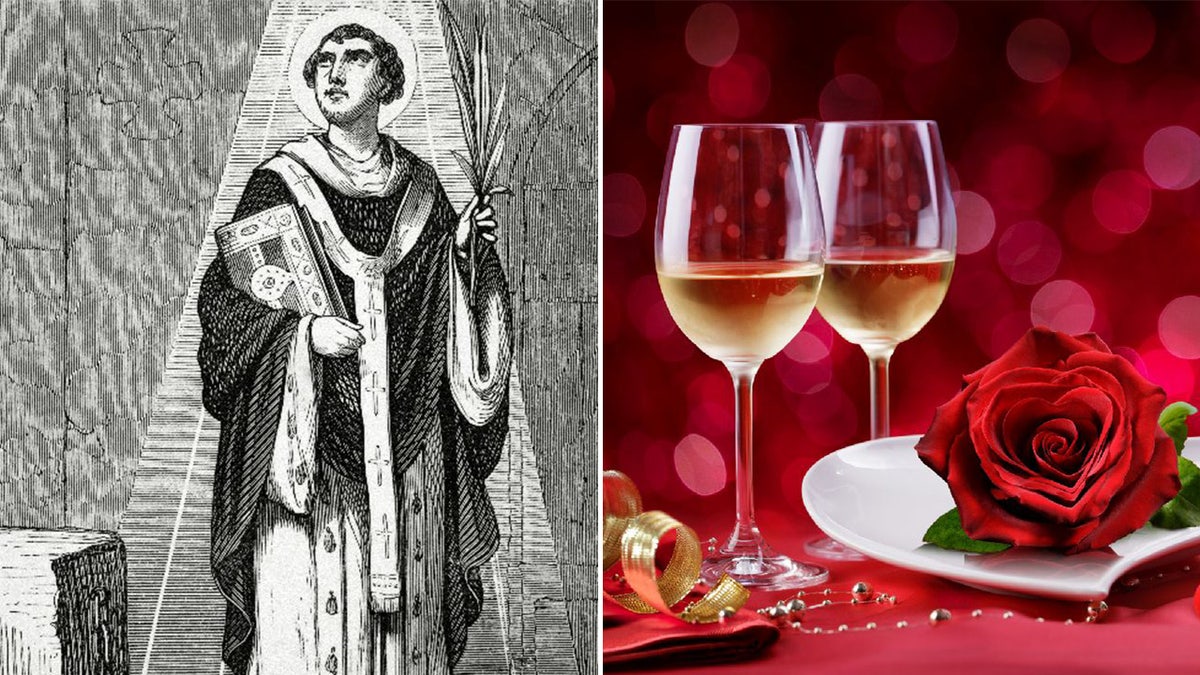Arrest your ex: Texas law enforcement offering Valentine's Day special
Orange County Precinct 4 offering to arrest your ex with outstanding warrants.
St. Valentine — the legendary Christian martyr who has served as inspiration for Valentine’s Day festivities for more than two millennia — is said to be the patron saint of love, beekeepers and epilepsy.
The exact date of his birth is not known, but it’s believed he lived sometime between the late 2nd and 3rd century A.D.
Historians also aren’t sure if the St. Valentine figure who is celebrated today is based on one or two religious martyrs who were put to death by the Roman emperor Claudius II Gothicus around 270 A.D., according to Britannica.
VALENTINE'S DAY BY THE NUMBERS: FUN FACTS ABOUT THE HOLIDAY
One legend that’s been passed down claims St. Valentine was a Roman priest and doctor who helped persecuted Christians get married, an action that was reportedly a crime under Gothicus’ rule and led to the saint’s jailing and eventual execution.

Left: An engraving of St. Valentine (3rd century A.D.) created by Cibera in Christian Century, 1853. Right: A red-themed Valentine's Day dinner table with a wrapped present, filled wine glasses and a single red rose. ( PHAS/Universal Images Group via Getty Images / iStock)
Pope Julius I of the Catholic Church reportedly ordered a basilica to be built over St. Valentine’s grave site on the Via Flaminia — an ancient road that connected Rome and Rimini.
Another popular legend claims St. Valentine was a bishop from Terni, Umbria (central Italy), who performed the same illegal Christian weddings and distributed paper hearts to symbolize their loving vows to God.
VALENTINE'S DAY QUIZ! HOW WELL DO YOU KNOW THESE FACTS ABOUT THE ANNUAL DAY OF LOVE?
This telling of St. Valentine’s story also ends with his imprisonment and ordered death. But, instead of having a basilica erected in his honor, this legend claims his belongings were sent back to Terni — the city where the Basilica di San Valentino was built in 1630.

Basilica di San Valentino is located in Terni, Italy. The place of worship honors St. Valentine, the Christian martyr who has served as inspiration for Valentine’s Day festivities around the world for more than two millennia. (iStock)
While it’s not clear if these two competing legends are of two different martyrs who officiated weddings and were sentenced to death around the same time, both are associated with St. Valentine, among others, Britannica and History.com report.
Some stories of St. Valentine include a tale of tragic romance where the martyred saint fell in love with his jailer’s daughter and either cured her blindness or another ailment, which reportedly led the family to convert to Christianity — a consequence that allegedly resulted in his death sentence.
This legend claims St. Valentine sent the jailer’s daughter a final note before his execution, where he signed off as, "Your Valentine."
ZOOS CONTINUE VALENTINE'S DAY TRADITION OF NAMING COCKROACHES, ANIMALS AFTER EXES AND LOVED ONES
By 496 A.D., Pope Gelasius reportedly declared Feb. 14 the Feast of Saint Valentine in an attempt to replace the pagan health and fertility holiday — the Feast of Lupercalia — with a Christian holiday, History.com reports.
Over time, the Feast of Saint Valentine became a day when people celebrated love, and eventually, it evolved into what is now known as Valentine’s Day.
English poet Geoffrey Chaucer has also been credited with associating romantic love with Valentine’s Day, according to researchers at the University of North Carolina at Chapel Hill.
CLICK HERE TO SIGN UP FOR OUR LIFESTYLE NEWSLETTER
Chaucer’s 14th-century poem "Parlement of Foules" tells the story of a group of birds that gather on Valentine’s Day for mate-pairing.
The Roman Catholic Church recognizes St. Valentine as a saint, but the organization removed him from the General Roman Calendar in 1969 because his origins have remained unclear.
Despite this move by the Catholic Church, Valentine’s Day is celebrated around the world and is a multibillion-dollar holiday industry, according to the National Retail Federation and various global market research reports.

Valentine's Day is observed on Feb. 14 each year. The day is traditionally celebrated with special holiday cards and chocolates. (iStock)
Heart motifs and varying shades of red are common design elements on Valentine's Day products.
CLICK HERE TO GET THE FOX NEWS APP
Gifts, candies, cards and flowers are typically exchanged between romantic partners, family members and close friends as a representation of love, according to traditions established in the U.S.









































